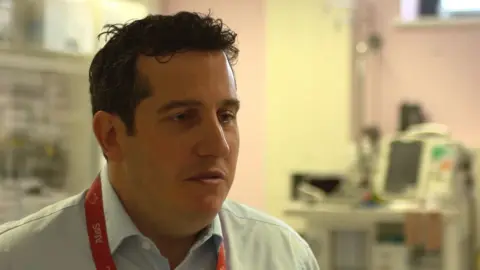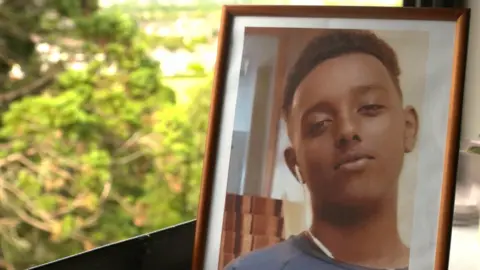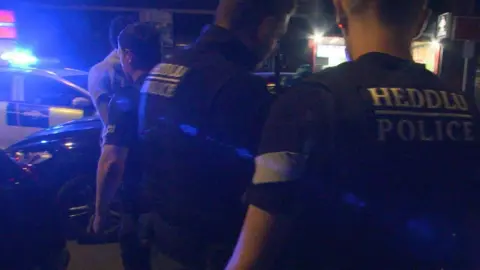Knife crime: Doctors see increase in 'punishment stabbings'
A senior doctor at Wales' biggest hospital has described how victims of knife crime are now being dealt with almost on a weekly basis.
Dr James Dunn, who works at University Hospital of Wales, Cardiff, said there had been an increase in "punishment stabbings", aimed at maiming victims.
The number of offences involving knives has gone up more than 80% across Wales in the past decade.
Police said teenagers as young as 15 are carrying knives.
Across Wales, in 2011 there were 741 incidents involving knives compared to 1,353 in 2018 - an increase of 83%.
The number of offences involving a knife dealt with by South Wales Police has almost doubled, from 382 in 2011 to 724 in 2018.

Accident and Emergency consultant Dr Dunn said: "All of us feel like we're seeing more knife crime.
"We have seen people stabbed in limbs over arteries. You think back to the days of punishment beatings in Northern Ireland with kneecappings."
And it is not just knives that are being used. He described how another deadly trend - called spoking - is emerging.
"Spoking is where you use a very thin spoke of a wheel," said Dr Dunn told BBC Wales Investigates.
"The wound isn't obviously dangerous when first performed but clearly a spoke that's six to eight inches long into the heart or liver is significant and as fatal as a zombie knife or kitchen knife."
Allow X content?
Undercover police officers working as part of Operation Sceptre - South Wales Police's response to the increased use of weapons - say the presence of "county lines" gangs, who move drugs from major cities into other areas, is pushing up the numbers of people carrying knives.
They said they know teenagers are being drawn into carrying knives and that they have even found weapons in playgrounds.
'Showed us thousands'
One 15-year-old, speaking anonymously, described how he was groomed into selling drugs by an older dealer.
"I used to have a normal life, watching football and playing games," he said.
"But then one day an older guy gave me expensive weed and money, showed us thousands and thousands of pounds in cash and nice clothes. He said if you wanna get in this game you can join me - so we done what he done."
The teenager said he carries a weapon on him or has one hidden close by when he is dealing.
He added he has witnessed county line dealers trying to take over in Cardiff, bringing new levels of violence with them.
"If you wanna survive you gotta be prepared to use violence," he said.
Fleeing Somalia, killed in Wales
 Nur Family
Nur FamilyWhen Fahad Mohamed Nur's parents left war-torn Somalia seeking safety in Wales, they could not have expected the 18-year-old would die on the streets of Cardiff but that's what happened in June this year when he was stabbed 21 times, near Cathays railway station.
His brother, who the BBC is not naming, was awoken at 06:30 BST to find police officers in his house, telling him his brother had died. He had to take in the news and then explain it to his mother, who does not speak English.
"I kept saying, 'Is this true, are you sure it's my brother?' And the woman said, 'It is, I am sorry to tell you'. That's when I broke down," he said.
"I will never forget in my life having to break the news to my mum.
"We came here as refugees, we came from violence. We thought this was a more peaceful country, and it is."
Fahad's family are raising money to name a well for him back in Somalia.
"It will be good for our family to see people will remember him and will still have that love for him," his brother added.
Three men have been charged with Fahad's murder.
'Dangerous message'
While the police are trying to tackle the deadly problem of knife crime, BBC Wales Investigates found two musicians in Cardiff using the backdrop of the city to sing about gang life, drugs and knives. Both of them have criminal convictions.
Pablo, real name Abdullah Khalid, was Tasered by police in the city earlier this year when he became violent. In the past he has had convictions for possession of drugs and a knife, as well as being stabbed himself.
And Jukkie, real name Laurent Mondo, spent time in prison for drug and knife crime but is now back on the streets, with videos to some of his tracks filmed in Grangetown and Butetown. Their videos have been watched hundreds of thousands of times. Both artists talk about selling drugs and carrying weapons.
Stephen Doughty, the MP for Cardiff South and Penarth, said the videos should be removed from the internet.
"It's a pretty clear message, you can have this glamorous lifestyle, you can have women, cars, trainers and money," said Mr Doughty.
"The reality is you're far more likely to face serious injury or lengthy jail time and the ruining of the rest of your life.
"In the same way as videos were glorifying people going off to fight with terrorist organisations - it's offering a lifestyle which simply doesn't exist."
Jukkie declined to be interviewed by the BBC. Pablo is currently behind bars.
'Arrests alone not the solution'

South Wales Police are fighting back, but Chief Constable Matt Jukes said the force cannot arrest its way out of the problem.
"We need to get on the front foot and deal with people who are bringing violence and drugs here but we can do that tomorrow and tomorrow and tomorrow and sadly there will be another young lad coming up from London with another rucksack full of drugs to the streets," he said.
"There is still a margin of difference between where we are and the bigger cities in the UK. We want to keep that space.
"I'd be deeply concerned if we didn't continue to push this threat back now and change that culture which is emerging."
BBC Wales Investigates Knife Crime: Behind the Violence is on Monday at 20:30 GMT on BBC One Wales.
